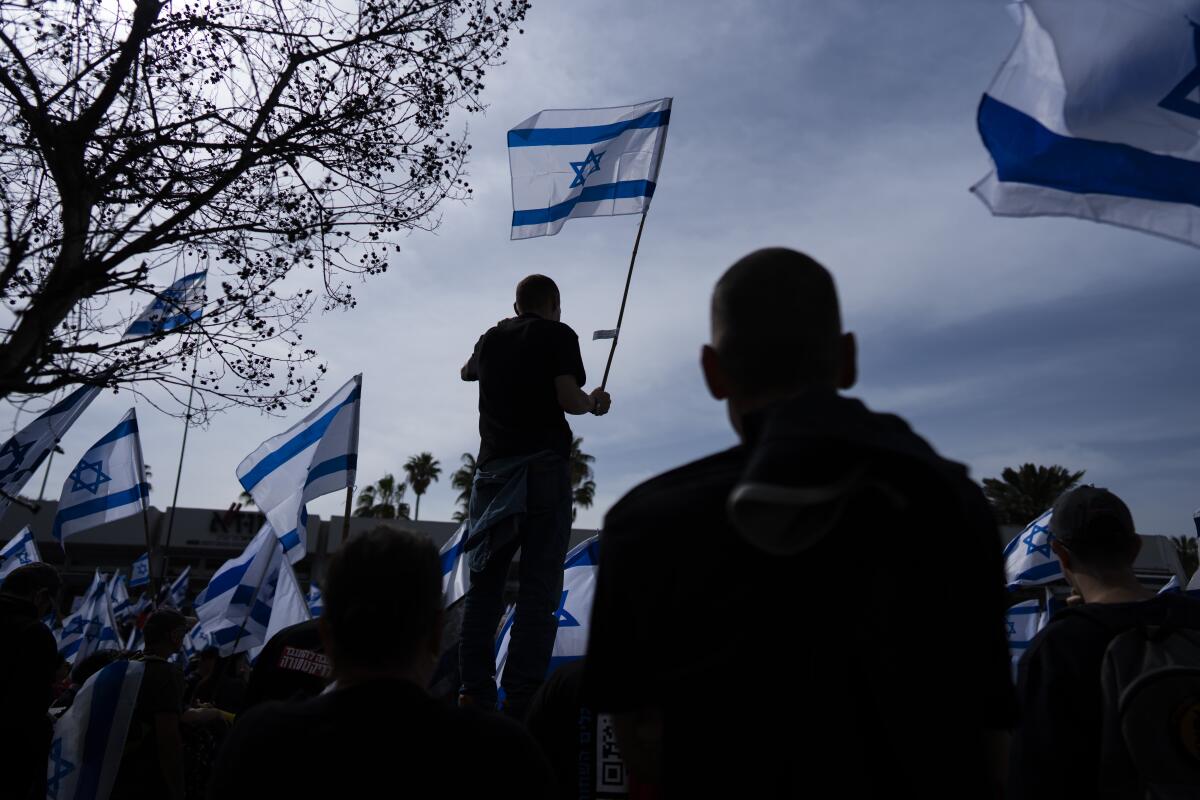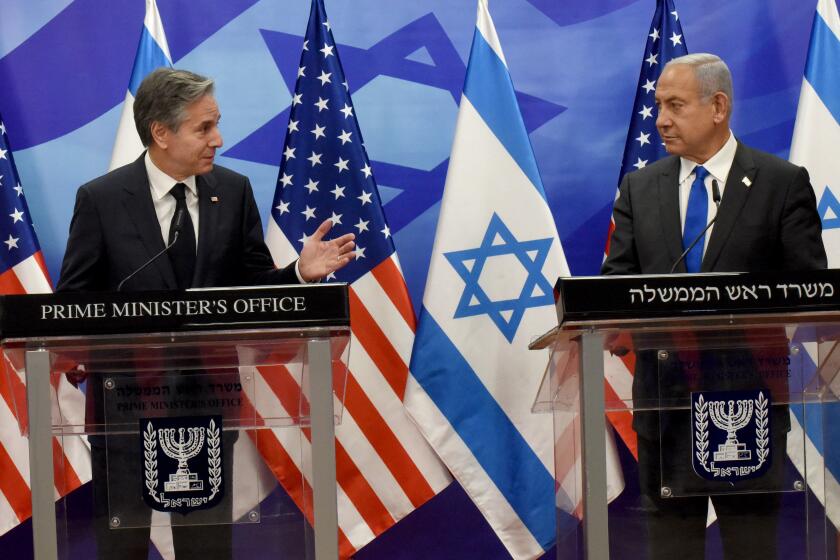Netanyahu seeks to soothe U.S. concerns over settlement law repeal

- Share via
JERUSALEM — Israeli Prime Minister Benjamin Netanyahu appeared to back down Wednesday, saying his government has no intention of returning to four abandoned settlements in the occupied West Bank under a law that was repealed by parliament this week.
His statement followed harsh U.S. criticism and an international uproar over Netanyahu’s far-right government, the country’s most hard-line ever, over the Knesset vote early Tuesday to revoke a 2005 law that dismantled the four settlements.
The Biden administration summoned Israel’s ambassador in Washington hours after the vote — a rare rebuke between the allies. Jordan’s parliament, meanwhile, in a largely symbolic vote, approved the expulsion of Israel’s envoy over the conduct of a firebrand minister.
Netanyahu said the Knesset vote Tuesday ended a period that discriminated against and humiliated Jews by not allowing them to live in “northern Samaria,” using the biblical term for the West Bank.
“That said,” he said, “the government has no intention to build new settlements in these areas.”
Crisis in Israel deepens over the new government’s radical plans, which have alienated and dismayed Israelis and Jewish Americans alike.
U.S. Deputy Secretary of State Wendy Sherman expressed the Biden administration’s concern to Israeli Ambassador Michael Herzog in Washington over the Knesset’s vote. Just days earlier, Israel had pledged not to approve new settlement construction or take unilateral actions. Since the 2005 law, Israeli citizens have been officially banned from returning to the four locations, though the Israeli military has allowed activists to visit and pray there.
Critics fear the vote could clear the way for rebuilding the four settlements, abandoned nearly 20 years ago when Israeli forces pulled out of the Gaza Strip, and further set back Palestinian hopes for statehood.
Sherman and Herzog discussed “the importance of all parties refraining from actions or rhetoric that could further inflame tensions leading into the Ramadan, Passover, and Easter holidays,” the U.S. State Department said.
Pressure against Israel’s new government mounted further Wednesday as the Jordanian parliament voted to expel Israel’s ambassador over Finance Minister Bezalel Smotrich’s speech at a podium adorned with a map of Israel that purportedly included Jordan. The incident over the weekend, the parliament in Amman said, “reflects Israeli arrogance that does not respect international treaties and covenants.”
Netanyahu’s new hard-line government has prioritized settlement construction and triggered unprecedented mass protests in the country against its plan to overhaul its legal system. On Wednesday in Tel Aviv, hundreds of older women calling themselves “grandmothers for democracy” rallied in protest against the legal overhaul. Some marched and others whirled in a circle dance as they chanted, “Democracy for our grandchildren.”
Blinken held several hours of consultations in one-on-one meetings with Israeli Prime Minister Benjamin Netanyahu, President Isaac Herzog and Foreign Minister Eli Cohen, who has been on the job just under a month as part of Netanyahu’s new far-right government.
The United States, along with allies Egypt and Jordan, is keen to keep the atmosphere calm as large numbers of Jewish and Muslim faithful pour into Jerusalem’s Old City, the emotional heart of the conflict. Two years earlier, tensions during Ramadan led to an 11-day war between Israel and the militant group Hamas in the Gaza Strip.
President Biden expressed his concern to Netanyahu during a phone call this week about the new government’s plan to roll back the judiciary’s insulation from the political system. After the Knesset vote, the State Department said it was “extremely troubled” and urged Israel to refrain from allowing settlers to return to the vacated areas.
However, Orit Strock — a Cabinet minister, member of the far-right Religious Zionism Party and a West Bank settler — dismissed the U.S. criticism, telling Army Radio that both sides “need to know how to accept these opinions and move forward in friendship.” Strock also gave an interview to the settler station Arutz 7 in which she expressed hope that Israel would one day reconquer the Gaza Strip as well.
Opposition leader Yair Lapid suggested on Kan radio Wednesday that the new government has squandered a measure of goodwill with the U.S.
It has “managed to destroy one of the greatest strategic assets we’ve ever had,” Lapid said. “I can’t explain to you how powerful it is when you, as prime minister or foreign minister, enter every room in the world and everyone knows that you are there and you got Washington’s backing. We don’t have that anymore.”
The Palestinians seek the West Bank and Gaza Strip as an independent state, with East Jerusalem as its capital. Israel captured those territories in the 1967 Middle East War. Since then, more than 700,000 Israelis have moved into dozens of Jewish settlements in the West Bank and East Jerusalem — which most of the world considers illegal and an obstacle to peace.
More to Read
Sign up for Essential California
The most important California stories and recommendations in your inbox every morning.
You may occasionally receive promotional content from the Los Angeles Times.












